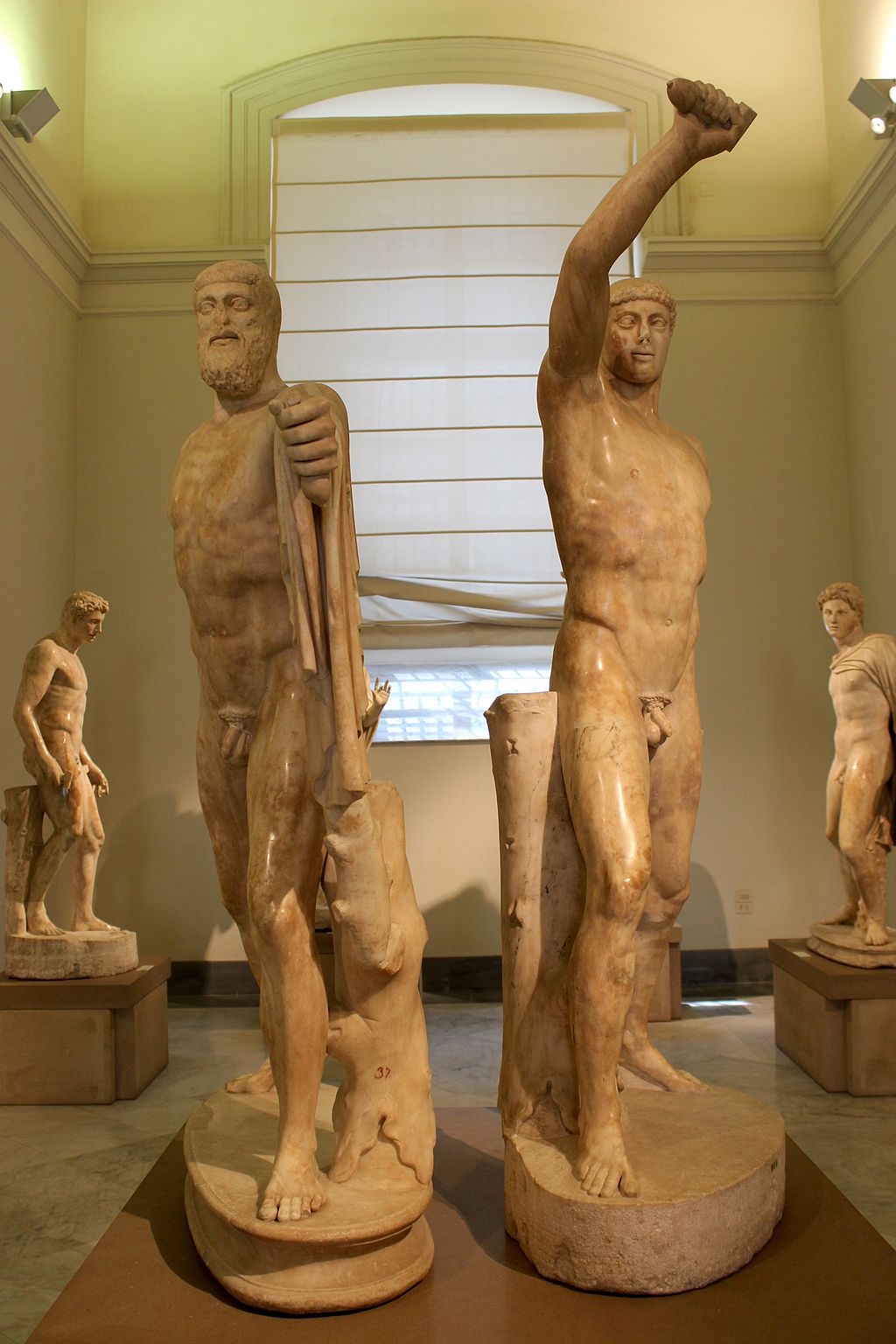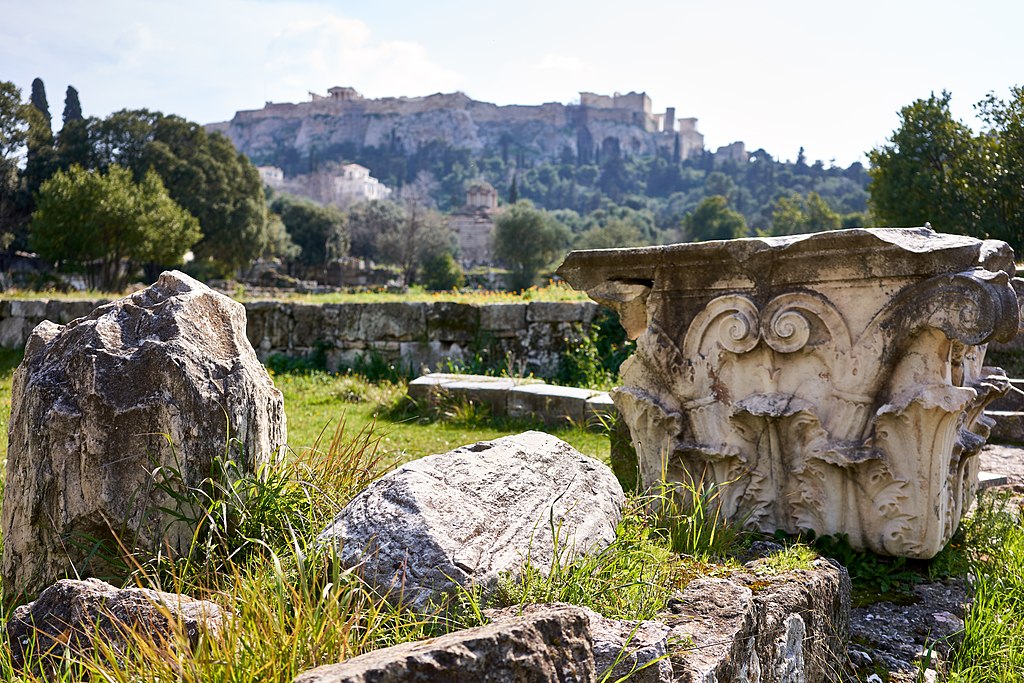Both Cleisthenes and Thrasybulus played important roles in the independence of Athens, and its existence as a democracy. Yet both their roles were downplayed by succeeding generations. Athens indeed spun the murder of the tyrant Hipparchus by a pair of disgruntled lovers into a fight against tyranny, but neglected Cleisthenes’ place in the true origins of the democracy. The citizens of the polis welcomed the freedom and democracy restored by Thrasybulus, but soon forgot his leading role in that effort. Once again, we ask “why?”
Cleisthenes
The historian Christian Meier speculates about the reasons for Cleisthenes’ countrymen’s lack of due respect:
We can only guess why they remembered him less. Because he did not die a martyr? Because he used Sparta’s assistance to free the city? Because he was merely a politician who presented motions rather than a celebrated wise man like Solon? No statue had been erected in Solon’s honor, either, but then that was not the custom at the time. Still, Solon carried out his entire reform with the help of extraordinary powers granted to him. Cleisthenes’ reform was the first presented to the popular assembly for discussion and approval.[1]
Anthony Everitt in The Rise of Athens presents the following interpretation of the story the Athenians told themselves. His chapter “Inventing Democracy” begins:
‘A bright light shone on the Athenians, when Aristogeiton
And Harmodius killed Hipparchus;
The two of them made their native land equal in laws.’
So reads the inscription on the marble base for a bronze statue group of the star-crossed lovers… It was written by that celebrated hired hand, Simonides… There they stood, proud and righteously angry, as cast by Antenor… These were the heroes who gave back to citizens their equal rights before the law—code for destroying the tyranny.
Popular songs have survived, which young bloods chorused over their wine at dinner parties.
‘Darling Harmodius, we know you are not dead.
They say you are in the Islands of the Blest
Where swift-footed Achilles lives.’
This is a puzzle. The assassination of Hipparchus in 514 was a botched and rather squalid business, done in a panic and lacking a truly idealistic motive. The regime survived the blow for some years and did not fall to a domestic uprising. Quite the reverse, it was a Spartan king prodded by the exiled Alcmaeonids who gave the Athenians their freedom. But this was generosity of a kind that is very hard to forgive.[2]

Everitt goes on to discuss the lack of recognition presented to Cleisthenes:
…Cleisthenes himself disappeared immediately, altogether and without explanation. Perhaps he just died, perhaps he was obliged for some reason to quit the scene. We will never know.
Athenians refused to acknowledge Cleisthenes’ contribution to the expulsion of the tyrants. This was among the reasons for the absurd over-promotion of the charming but incompetent Harmodius and Aristogeiton. Everyone seemed to be singing about them whenever Athenians came together to eat, drink, and celebrate. No wonder if Cleisthenes made his excuses and stepped out of the historical record.[3]
Thrasybulus
Explanations for the lack of celebration of Thrasybulus’ achievements are hard to come by as are the examples of celebration. Historian Robert J. Buck makes an attempt to explain the reasons why as follows:
It is clear that there were efforts by some of his contemporaries and by historians who drew on them to deprive Thrasybulus of credit for the various deeds he did to save Athens and restore the Empire… Even his strenuous efforts to restore Athenian finances were played down, and he was by implication accused of graft and corruption, and of brutal treatment of the allies.
Why, then, were there so many efforts to deprive Thrasybulus of any credit and glory? Rival politicians and generals tried to seize some, most activities requiring some sort of collaboration. Claims for credit and accusations of blame were picked up by various orators and historians. Clearly both ancient and modem scholarship does not know quite what to make of Thrasybulus. The anti-democratic tradition of ancient historiography has been the predominant one, unwilling to recognize any merit in most democrats and willing to ascribe any great deeds to less democratic leaders, to an Archinus over a Thrasybulus. And after all, he was defeated several times, he was responsible for brutalities in collecting funds, and he did not succeed in restoring the Athenian Empire.
I think the reason for the luke-warmness of the estimates of him by many modem scholars is that he is an anachronism, a figure from the past endeavoring to cope with very changed modern conditions – and he was no adaptable Alcibiades. He was frozen to the ideas and ideals of the democratic Athens of the heyday of the Athenian Empire in the fifth century, believing in the essentially beneficent mission of the Delian League and of Athens, as outlined for all in the funeral speech of Pericles. Here he is, in the closing phases of the Peloponnesian War, with Athens sliding to defeat and rule by quislings and epigoni, remembering its glories and trying to turn the clock back. He continued to do this after democracy was restored and on into the Corinthian War. But a lot of Athens had died in Sicily and at Aegospotami; Athens was no longer the state it was when it had been guided by Pericles. But that was the state that Thrasybulus thought he was living in and was trying to bring back to its former glories. Surely this is not an ignoble ideal he was following.
Thrasybulus emerges from all this as a capable man, a good organizer, a superb admiral, a mediocre general[4], personally brave, a competent administrator, a plain orator, an admirer of democracy, honest and honorable, though with a quick temper and a fondness for taking short cuts. He must have seemed to his contemporaries a curious type, and, as we can see from Lysias, they thought of him as old-fashioned in speech and diction, but a dynamic leader; someone who could, for a time, pull everyone together and inspire them in their darkest hours; a man of strategic sense and vision, but one not able to perform miracles; one who believed in the greatness of his country and its Empire, after its Empire had vanished; someone a little quaint and not quite real; someone to be admired, with a sigh of regret. Winston Churchill, with his old fashioned rolling Gladstonian style of oratory and Macaulay-like style of prose, his old fashioned views on empire, his similar abilities to unite everyone behind him for a time and perform magnificently in a crisis, and his very mixed assessments at the present, is the modern figure that springs to mind as a parallel, and I do not think it is a bad one.[5]

Closing thoughts
What are we to make of all this? As noted above, it is my belief that societies tell themselves—even make up—the stories about themselves they want to hear or need to hear. What does an Athenian democracy tell us, which for all intents and purposes ignores the actions and accomplishments of the two individuals who were most responsible for the initiation and continuance of that democracy?
Many ideas have been put forward: the Athenians did not want to remember that Spartan assistance was instrumental in the end of the Peisistratus tyranny, and reconciliation after the tyranny of the Thirty; Cleisthenes and Thrasybulus were involved in politics and their political opponents did not want to give them credit; Cleisthenes only “brought the people into his party” when he was on the losing side of political conflict; Thrasybulus attempted and failed to resurrect the Athenian Empire. Instead, the Athenians seem to have focused on Solon the Lawgiver, Theseus the Founder, Harmodius and Aristogiton the Tyrannicides, the Centauromachy, the Amazonomachy. In other words, myths.
I’m not that familiar with the stories the British and French, mentioned in the introduction, tell themselves, but I know they celebrate the Magna Carta, the Bastille and the Declaration of the Rights of Man; but I’m very familiar with the story that the United States tells itself. And George Washington is central to that story. Whether for historians or the general public, George Washington is the principal Founder. The other Founders, Sam and John Adams, Ben Franklin, Thomas Jefferson, Alexander Hamilton, James Madison, as well as The Marquis de Lafayette, the French, etc. all make indispensable contributions to the story. But Washington is central to it. Member of the Colonial Congress which issued the Declaration of Independence, Commander of the Colonial Army, suppressor of a potential Army officers’ rebellion, Chairman of the Constitutional Convention, First President, and the first national leader (since the fabled Cincinnatus) to voluntarily step down from office.
And yet, like Cleisthenes and Thrasybulus, Washington was not flawless. A slaveholder all his life, he only freed his slaves on his death (something no other Southern “founder” did to my knowledge); he lost more battles during the War of Independence than he won, just as Thrasybulus lost some battles. The defeat of Britain and victory at Yorktown could not have been effected without French assistance and a French fleet, just as both Cleisthenes and Thrasybulus required Spartan help, or acquiescence, in their reforms. Despite his inclinations, Washington became involved in politics due to the resistance and undermining of his administration by Jefferson and Madison and their partisans, just as both Cleisthenes and Thrasybulus participated in democratic politics with their partisans. But despite Washington’s failings, he has remained central to the story Americans tell themselves. But for Cleisthenes and Thrasybulus, despite their very real accomplishments, they went missing in the minds of their fellow citizens, supplanted by myth. Yes, Washington the Myth arose. But frequent historical biographies continue to present Washington the man.
So why the difference? Why did Athens write out of history the men and events which were so instrumental to its freedom and democracy, while other societies celebrate them? Why does the United States celebrate Washington, while Athens ignored Cleisthenes and Thrasybulus? Is this simply the difference between an ancient society and a modern one? The difference between a society conceived using the Enlightenment value of reason, versus one which, despite its invention of democracy, historiography, drama, and philosophy, was also based on the belief in myths swirling out from the depths of time?
Related topics
Founders of democracy unsung | Part 1: Cleisthenes’ democracy
Founders of democracy unsung | Part 2: Re-establishment of democracy by Thrasybulus
Notes
[1] Meier, Christian. 1993. Athens: A Portrait of the City in Its Golden Age, p. 188, Metropolitan Books, New York
[2] Everitt, Anthony. 2016. The Rise of Athens, pp. 95–96, Random House, New York
[3] Everitt, p. 107
[4] Note: unclear to me why Buck thinks him a mediocre general: Thrasybulus defeated the Thirty at Phyle and Munychia, and gave the Spartans a tough fight at Piraeus, leading to a settlement.
[5] Buck, Robert J. 2014. Thrasybulus and Athenian Democracy, pp 122–123, Franz Steiner Verlag, Stuttgart.
Image credits
Harmodio y Aristogeiton Nápoles. Museo Archeologico Nazionale.
Photo: Miguel Hermoso Cuesta, Creative Commons Attribution-Share Alike 3.0 Unported license. via Wikimedia Commons
Ruins of the Ancient Agora of Athens
Photo: George E. Koronaios Creative Commons Attribution-Share Alike 4.0 International license. via Wikimedia Commons
___
First Published August 15, 2019
Ian Joseph is a member of the Kosmos Society.